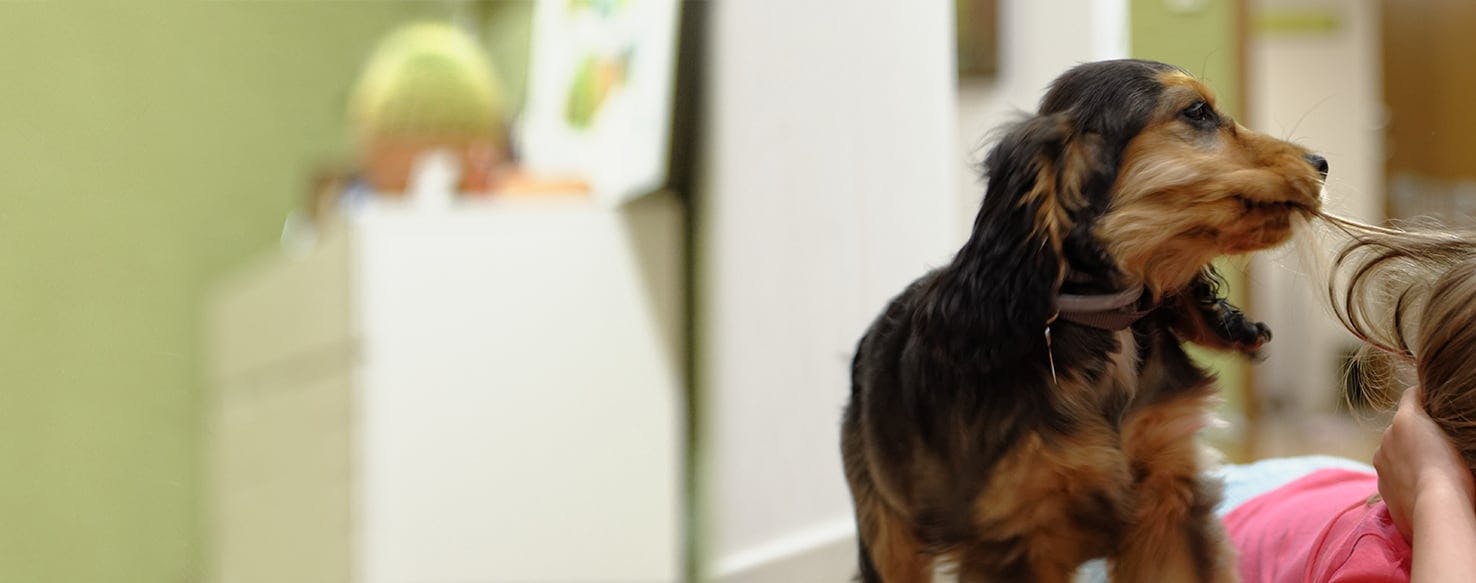Dogs may eat your hair due to boredom, anxiety, or nutritional deficiencies. In this article, we will explore the reasons why your dog might be chewing on your hair and what you can do to prevent it.

If you have ever found your dog snacking on your hair, you may be wondering why they do it. While it may seem like an odd behavior, there are various reasons why dogs eat hair. From boredom to anxiety, there are several factors to consider.
This article will explore the potential reasons for this behavior and offer tips on how to put a stop to it. Additionally, we will provide insight into how to make sure your dog is properly nourished to prevent any nutritional deficiencies that may lead to hair-eating tendencies. Stick with us to get to the root of your dog’s hair-eating behavior.

Credit: wagwalking.com
What Is Trichophagia?
Trichophagia, the compulsion to eat hair, is a condition that dogs can suffer from. It’s relatively rare but can manifest in any breed. The term trichophagia comes from greek and translates to hair-eating. Symptoms include vomiting, diarrhea, and constipation. Dogs suffering from trichophagia may also experience weight loss, lethargy, and abdominal swelling.
Trichophagia occurs when dogs start pulling out their hair and then subsequently eat it. This may be due to stress, anxiety, boredom or a nutritional deficiency. Trichophagia can create blockages and other digestive issues that can cause severe harm to your furry friend.
If your dog exhibits any of these symptoms, it’s best to consult a veterinarian to prevent any further, serious health issues.
Reasons For Trichophagia In Dogs
Trichophagia, or the habit of eating hair, is not uncommon in dogs. Boredom and anxiety are common reasons why your furry friend may resort to hair ingestion. In some cases, trichophagia may be a symptom of nutritional deficiencies or genetics.
It can also be a sign of obsessive-compulsive disorder. If left unchecked, trichophagia can lead to serious health issues for your dog. Some signs to watch out for include vomiting and constipation. To address this problem, it’s important to identify the root cause of the behavior.
Keeping your dog busy with toys or regular exercise can help alleviate boredom and anxiety. If the behavior persists, consult with your vet to rule out any underlying health conditions.
How To Prevent And Treat Trichophagia In Dogs
Trichophagia, or the habitual consumption of hair, can be a concerning behavior in dogs. Providing regular mental and physical stimulation through activities such as playtime and exercise can help reduce the likelihood of developing trichophagia. A balanced diet with appropriate supplements can also aid in preventing this behavior.
If the behavior persists, medication may be necessary to treat any underlying anxiety or compulsive disorders. Professional training can also assist in addressing the behavior. By taking these preventative measures, owners can help ensure their dog’s overall health and well-being while minimizing the risk of trichophagia.
What Kind Of Hair Do Dogs Eat?
Dogs are notorious for eating strange things, including their owner’s hair. Human hair isn’t exactly the same as animal hair, but dogs chew on both. Hair can be found everywhere in homes, including the floors and furniture. It’s essential to maintain your dog’s coat to avoid excessive shedding.
Regular grooming and proper diet may help control shedding. Taking your pet to the vet can often help provide even further solutions to excess shedding. By addressing dog shedding, you can reduce the amount of time spent cleaning your home, and improve your dog’s overall health and comfort.
Frequently Asked Questions
Why Does My Dog Eat My Hair?
Dogs may be attracted to the texture, smell or taste of human hair. Observe your dog for signs of anxiety or boredom, which may lead to hair-eating behavior. Providing regular grooming, exercise and interactive toys can discourage the behavior.
Is It Dangerous For Dogs To Eat Hair?
Eating hair can lead to gastrointestinal blockages, which can be life-threatening if not treated immediately. Signs of a blockage include vomiting, diarrhea, constipation, loss of appetite, and lethargy. Consult with a veterinarian if your dog shows any of these symptoms.
How Can I Stop My Dog From Eating My Hair?
Redirect your dog’s attention by providing appropriate chew toys or bones. Regularly brush and groom your hair to diminish the scent and accessibility of loose hair. Consider using positive reinforcement using treats or praise to reward your dog when exhibiting desirable behavior.
Can A Dietary Deficiency Cause Hair-Eating Behavior In Dogs?
Yes. A deficiency of essential nutrients can cause hair-eating behavior in dogs. Consult with a veterinarian to evaluate your dog’s diet and recommend appropriate supplements or dietary changes. Grooming your dog regularly can also help you to notice any skin or hair problems before it deteriorates.
Does Hair-Eating Behavior Indicate An Underlying Medical Condition?
Hair-eating behavior can indicate underlying medical conditions such as pica or obsessive-compulsive disorder (ocd). Consult a veterinarian to rule out these conditions if your dog’s hair-eating is persistent or excessive. Keeping an eye on your dog’s behavior and interacting with your dog with love and care can help to prevent these disorders.
Conclusion
Now that you understand the reasons why dogs eat hair, you can take the necessary steps to prevent this behavior. It is crucial to pay attention to your dog’s diet and ensure they are consuming a balanced and protein-rich meal.
Regular grooming and providing chew toys can also help keep their chewing habits in check. It’s important to watch for signs of an underlying medical issue, such as anxiety or pica, and speak with your vet if you suspect any could be contributing to your dog’s hair-eating habits.
Remember that patience and consistent training can go a long way in eliminating unwanted behavior. With a bit of effort and attention, you can help your furry friend live a happy and healthy life.












GIPHY App Key not set. Please check settings